I've been playing with some Perl programs to calculate excellent numbers. Although the runtimes for my solutions were acceptable, I thought a different language, especially one designed for numeric stuff, might be faster. A friend suggested Julia, but the performance I'm seeing is so bad I must be doing something wrong. I've looked through the Performance Tips and don't see what I should improve:
digits = int( ARGS[1] )
const k = div( digits, 2 )
for a = ( 10 ^ (k - 1) ) : ( 10 ^ (k) - 1 )
front = a * (10 ^ k + a)
root = floor( front ^ 0.5 )
for b = ( root - 1 ): ( root + 1 )
back = b * (b - 1);
if back > front
break
end
if log(10,b) > k
continue
end
if front == back
@printf "%d%d\n" a b
end
end
end
I have an equivalent C program that's an order of magnitude faster instead of the factor of 2 noted on the Julia page (although most of the Stackoverflow questions about Julia's speed seem to point out flawed benchmarks from that page):
And the non-optimized pure Perl I wrote takes half as long:
use v5.20;
my $digits = $ARGV[0] // 2;
die "Number of digits must be even and non-zero! You said [$digits]\n"
unless( $digits > 0 and $digits % 2 == 0 and int($digits) eq $digits );
my $k = ( $digits / 2 );
foreach my $n ( 10**($k-1) .. 10**($k) - 1 ) {
my $front = $n*(10**$k + $n);
my $root = int( sqrt( $front ) );
foreach my $try ( $root - 2 .. $root + 2 ) {
my $back = $try * ($try - 1);
last if length($try) > $k;
last if $back > $front;
# say "\tn: $n back: $back try: $try front: $front";
if( $back == $front ) {
say "$n$try";
last;
}
}
}
I'm using the pre-compiled Julia for Mac OS X since I couldn't get the source to compile (but I didn't try beyond it blowing up the first time). I figure that's part of it.
Also, I see about a 0.7 second start up time for any Julia program (see Slow Julia Startup Time), which means the equivalent compiled C program can run about 200 times before Julia finishes once. As the runtime increases (bigger values of digits) and the startup time means less, my Julia program is still really slow.
I haven't gotten to the part for very large numbers (20+ digit excellent numbers) which I didn't realize Julia doesn't handle those any better than most other languages.
Here's my C code, which is a little different from when I started this. My rusty, inelegant C skills are essentially the same thing as my Perl.
#include <math.h>
#include <stdio.h>
#include <stdlib.h>
int main( int argc, char *argv[] ) {
long
k, digits,
start, end,
a, b,
front, back,
root
;
digits = atoi( argv[1] );
k = digits / 2;
start = (long) pow(10, k - 1);
end = (long) pow(10, k);
for( a = start; a < end; a++ ) {
front = (long) a * ( pow(10,k) + a );
root = (long) floor( sqrt( front ) );
for( b = root - 1; b <= root + 1; b++ ) {
back = (long) b * ( b - 1 );
if( back > front ) { break; }
if( log10(b) > k ) { continue; }
if( front == back ) {
printf( "%ld%ld\n", a, b );
}
}
}
return 0;
}

